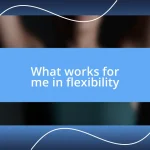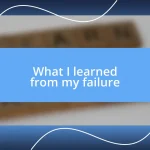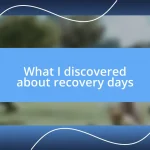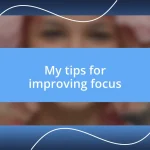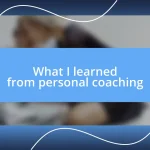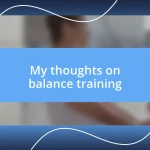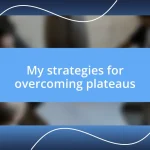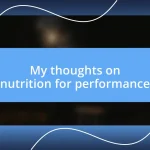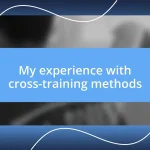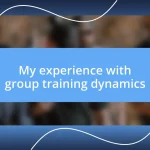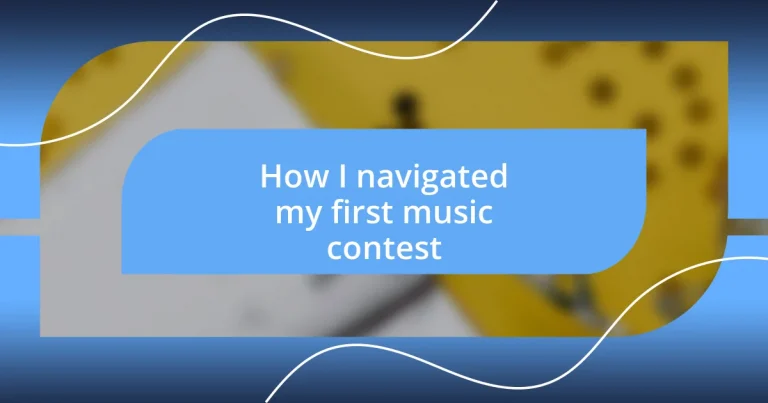Key takeaways:
- Preparation involves a comprehensive plan, including song selection, practicing stage presence, and emotional journaling to build confidence.
- Engaging with judges during the performance creates a deeper connection, enhancing the overall experience and potentially boosting confidence.
- Reflecting on the contest experience reveals personal growth, connections with fellow contestants, and the realization that competition is about self-discovery rather than just winning.
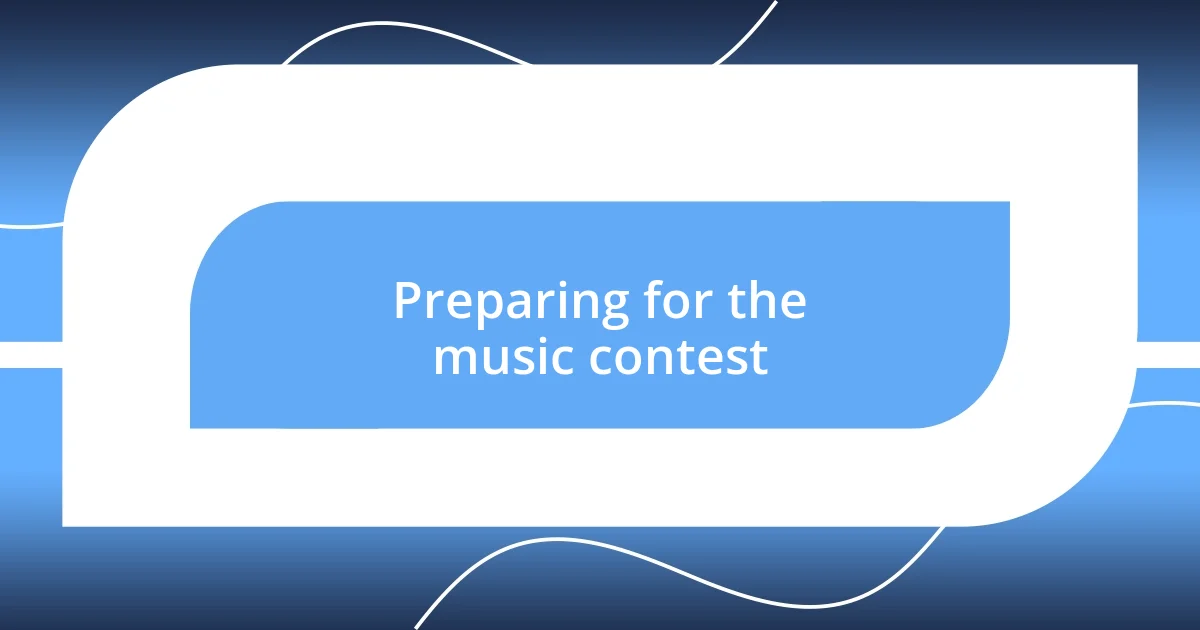
Preparing for the music contest
Preparing for a music contest is about more than just possessing talent; it’s about creating a solid plan. I remember feeling that familiar flutter of nerves in my stomach as I listed all the things I needed to tackle. Did I have enough practice time scheduled? Was my setlist cohesive? These questions became invaluable milestones during my preparation.
As I dove into rehearsals, I discovered the importance of not just practicing my songs but also honing my stage presence. Picture this: me in front of my mirror, performing with exaggerated gestures, trying to imagine the audience’s reaction. It’s funny how I sometimes wondered if I looked silly, but in looking back, I realize it was a crucial process that helped me build confidence.
Then there was the emotional side of preparation. I found journaling to be a therapeutic outlet, where I poured out my excitement and fears, turning them into fuel. Isn’t it fascinating how capturing our thoughts can shift our perspective? I felt lighter as I wrote, allowing myself to focus on the joy of sharing my music rather than the fear of failure.
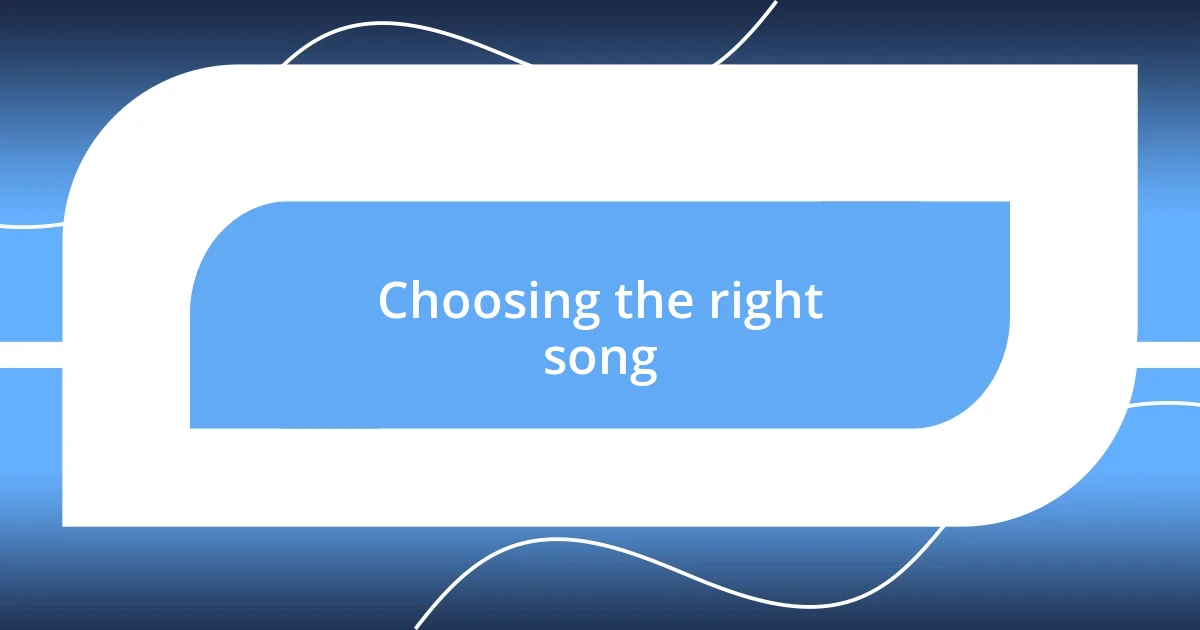
Choosing the right song
Choosing the right song for a contest can feel like a daunting task, yet it’s one of the most critical decisions you’ll make. I remember feeling a rush of excitement when I thought of potential songs, but that quickly turned into anxiety as I considered the audience and judges. A song that resonates with me may not necessarily resonate with others. So, I started evaluating my options deeply.
Here are some factors I kept in mind while selecting my contest song:
- Emotional connection: I chose a song that had personal meaning, allowing me to convey genuine emotions.
- Audience appeal: Understanding the type of music the contest favored helped me pick a song that would engage listeners.
- Vocal range: I ensured the song fit within my vocal abilities, as I didn’t want to risk straining my voice.
- Storytelling: I opted for a song that told a story, making it easier to connect with the audience through my performance.
- Performance style: I reflected on how the song could showcase my unique style and personality, which is key in standing out.
Ultimately, trusting my instincts led me to the right choice. It was exhilarating to sing a song that not only highlighted my strengths but also resonated passionately with the audience.
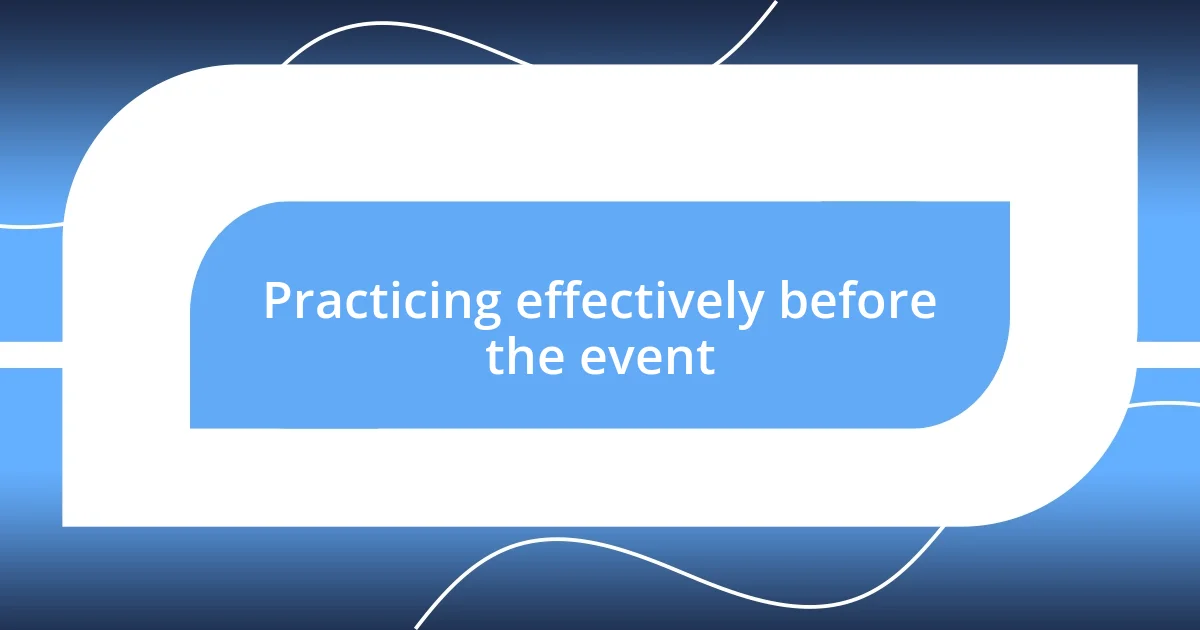
Practicing effectively before the event
Practicing effectively before the event became a journey of self-discovery for me. I remember setting aside dedicated time each day to focus on my performance—no distractions, just me and my music. Initially, I struggled to keep a consistent practice routine, but once I realized that creating a schedule was key, everything fell into place. What about you? Finding that rhythm can be hard, but it’s rewarding.
As the contest approached, I started incorporating mock performances into my practice sessions. One day, my family gathered in the living room as my “audience.” I was a bundle of nerves, but their cheers and feedback lit a fire in me. This experience not only helped with my confidence but also allowed me to refine my performance based on real-time reactions. Have you ever tried performing in front of others? It’s a game changer!
I also discovered the power of recording my practice sessions. Typically, it felt awkward to hear my own voice, but reviewing those recordings became a crucial part of my development. I identified nuances in my singing that I might have missed while performing live. It was enlightening to hear where I excelled and areas that needed improvement, making practice feel like a continuous journey rather than a chore.
| Practice Method | Description |
|---|---|
| Scheduled Practice | Set aside dedicated time daily to focus deeply on specific skills or songs. |
| Mock Performances | Performing in front of friends or family creates a supportive environment to practice stage presence and receive feedback. |
| Recording Sessions | Recording and reviewing practice helps identify strengths and areas for improvement, providing valuable insight into your performance. |
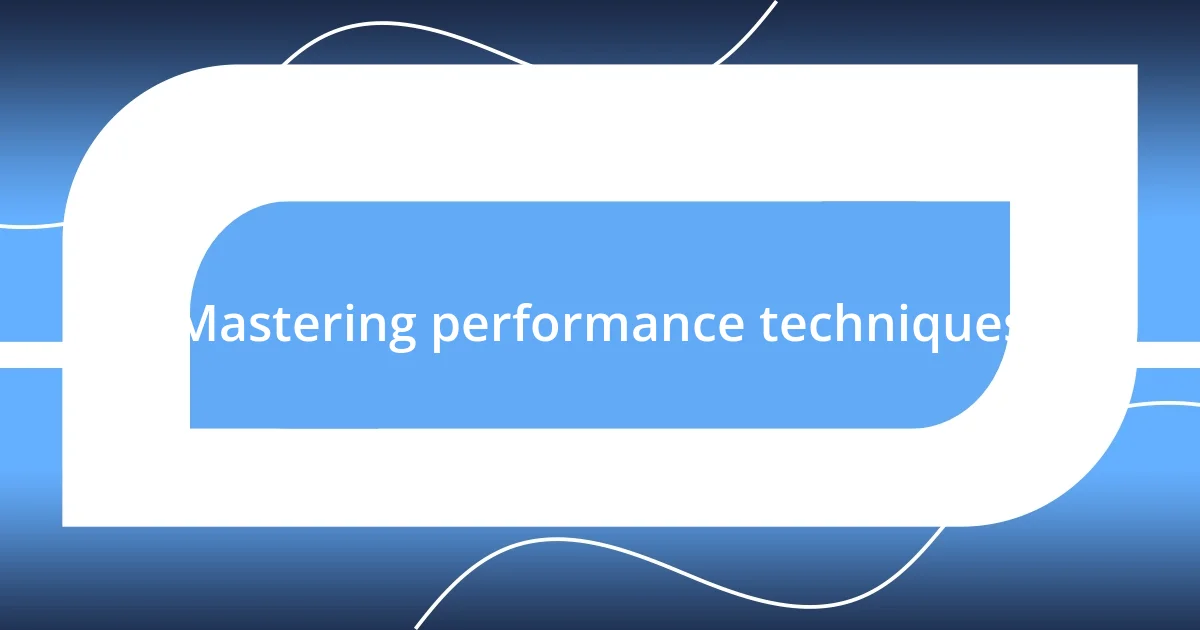
Mastering performance techniques
Mastering performance techniques isn’t just about hitting the right notes; it’s all about how you connect with the audience. One evening, as I was rehearsing, I noticed that adding small gestures and facial expressions made a significant difference. When I allowed myself to embody the emotions of the song—really feeling every word—I found that my delivery was much more powerful. Isn’t it fascinating how something as simple as a smile or a purposeful hand movement can elevate a performance?
Then, there’s the breath control, which I had to work on tirelessly. I vividly remember a time during practice when I held a note, and instead of feeling stable, I found myself gasping for air. That experience was a reminder of how crucial breath management is while singing. Learning diaphragmatic breathing changed everything for me; it gave me newfound control and allowed me to convey emotion without worrying about running out of breath in the middle of a phrase. Have you ever noticed how a confident singer commands the stage with their breath?
Lastly, I learned that improvisation could be a game changer in my performances. At one point, my nerves got the best of me, and I stumbled over a lyric. Instinctively, I decided to riff on the melody instead, making it my own. While my heart raced, I realized that embracing those little surprises could actually endear me to the audience. It’s moments like these that remind us we’re all human. Have you ever encountered an unexpected moment on stage? Those can often turn into the best stories to tell!
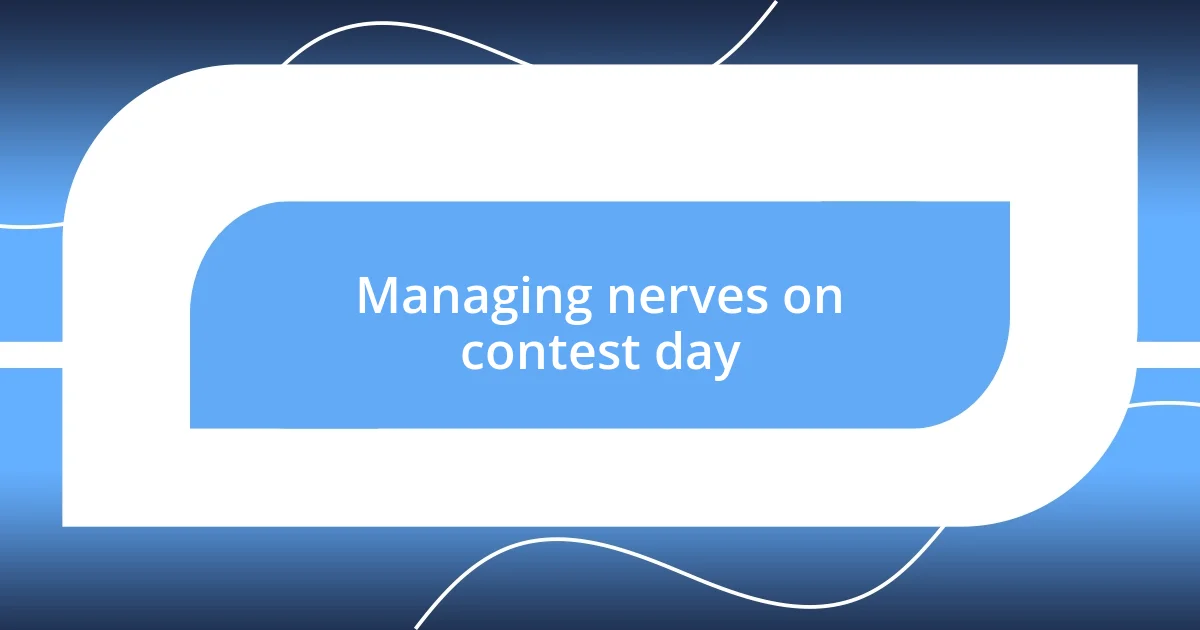
Managing nerves on contest day
Managing nerves on contest day was a challenge I didn’t anticipate. I remember waking up that morning feeling like a tightly wound spring, ready to snap at any moment. It was essential for me to ground myself, so I turned to deep breathing techniques. Inhale for a count of four, hold for four, exhale for six—that simple rhythm calmed the storm within and reminded me that I could take control.
As I arrived at the venue, I noticed the anxious energy buzzing around me. Instead of shying away from it, I decided to embrace it. I struck up a conversation with another contestant who looked just as nervous. Sharing our fears somehow lightened the load. Have you ever found that talking to someone else can lift your spirits? That moment reaffirmed that I wasn’t alone in this experience.
Right before my turn, I focused on visualizing my performance. I closed my eyes and imagined the audience cheering, felt the warmth of the lights, and pictured myself singing with confidence. This mental imagery transformed my nerves into excitement. It’s incredible how shifting your mindset can change the entire atmosphere of your performance. Have you ever tried visualizing your success? It felt like my nerves morphed into a powerful source of energy that carried me through to the stage.
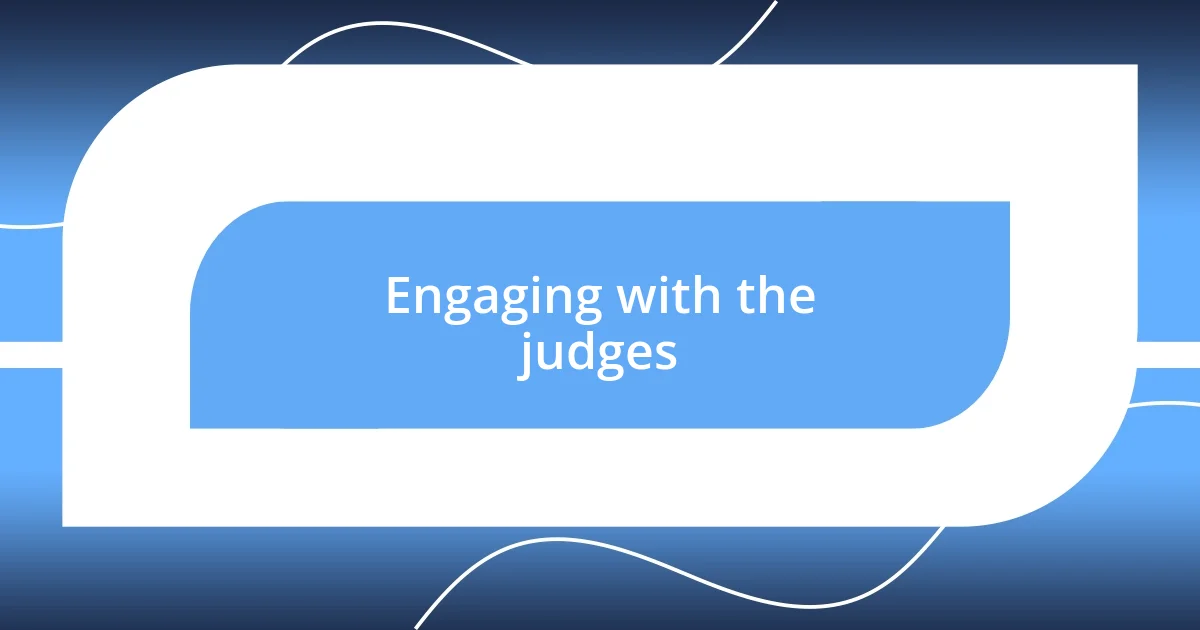
Engaging with the judges
Engaging with the judges during my first music contest was a pivotal part of my experience. I remember stepping on stage and making eye contact with them; it felt like reaching out across a vast space. There’s something magnetic about connecting with the judges directly—suddenly, it’s not just about the notes you’re singing, but about telling a story that resonates with them. Have you ever found that when you look someone in the eye, it fosters a deeper connection?
As I performed, I consciously tried to gauge their reactions. A slight nod or a smile from a judge can give you an exhilarating jolt of confidence. I recall a moment when I saw the judge tapping their foot to the rhythm; it felt like an unspoken encouragement that pushed me to give my all. It reminded me that engaging the judges is not just about impressing them, but sharing an experience. Do you believe that energy can be exchanged between performers and their audience?
After I finished, I made sure to thank the judges for their time. Their feedback was genuine and constructive, and I truly appreciated it. In my opinion, acknowledging their presence not only shows respect but also opens the door for future interactions. I even remember asking one judge a question about their critique during a break, which led to an enlightening discussion. Those moments crystallized for me the idea that building rapport with judges doesn’t end when the performance does; it’s an ongoing conversation. What connections have you made because you reached out?
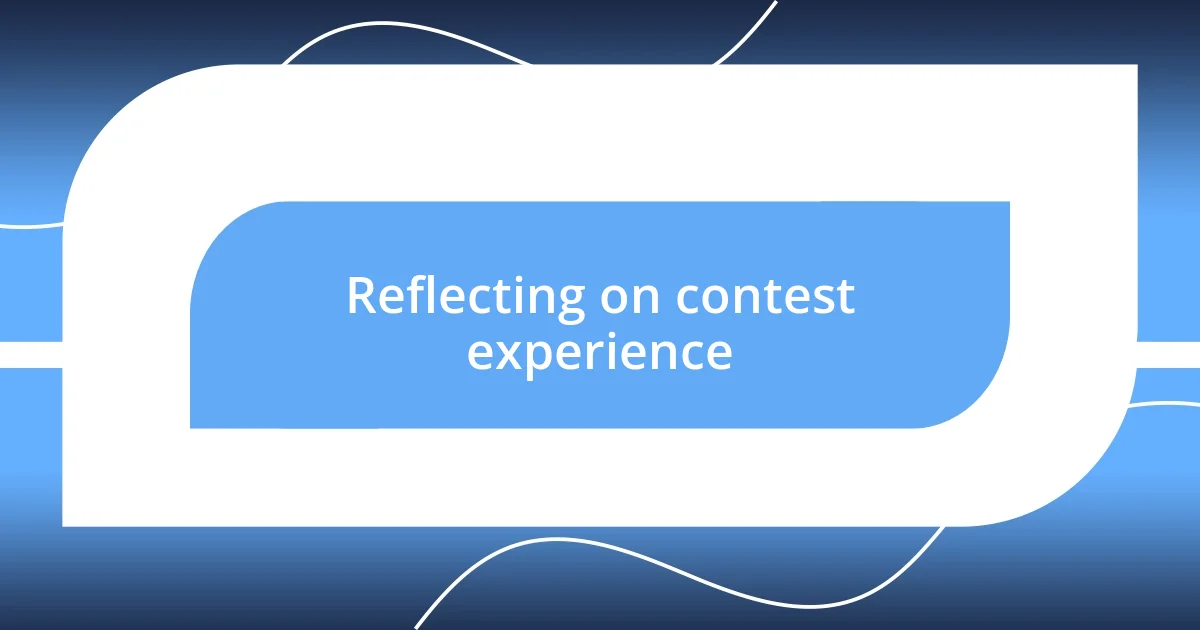
Reflecting on contest experience
Reflecting on my contest experience, I find myself often revisiting those moments of uncertainty and triumph. I remember standing backstage, my heart pounding, and thinking, “Was it worth all the effort?” As I look back now, I see the growth not just in my music but in my confidence. Those few minutes on stage were a whirlwind, but they unraveled a tapestry of learning that’s still influencing my journey today.
What strikes me the most is how every performance felt like peeling back layers of myself. With each note I sang, I found a deeper connection not only to the music but to who I am as an artist. I’ve come to realize that contests aren’t just about winning; they’re a mirror reflecting our vulnerabilities and strengths. Have you ever had a moment where you truly embraced who you are, despite the pressure around you?
I also cherish the camaraderie that blossomed with fellow contestants. We were all vying for the same prize, yet there was a sense of unity that made the experience richer. I recall sharing a laugh with someone right after our performances, both of us a little teary-eyed and exhilarated. In that moment, I realized that each of us carried our dreams and struggles, creating an unspoken bond that transcended competition. It’s thrilling to think that, in the end, those connections often mean more than any trophy could. How has competition shaped your own relationships?
